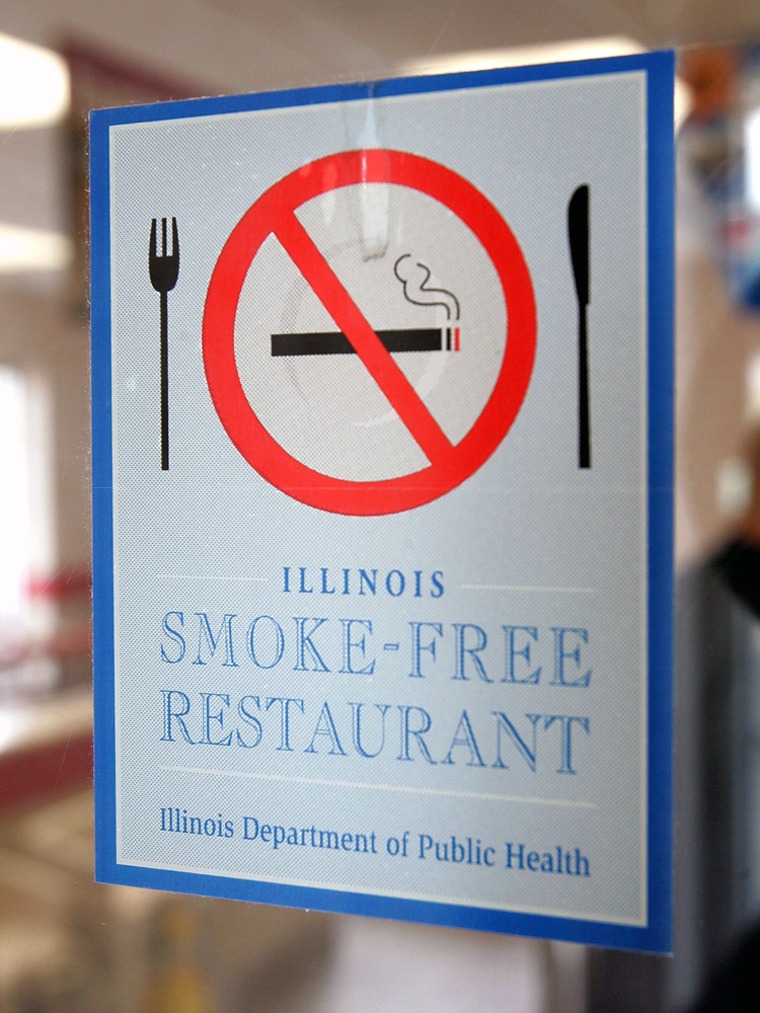Americans smoked fewer cigarettes last year than at any time since 1951, and the nation's per capita consumption of tobacco fell to levels not seen since the early 1930s, the association of state attorneys general reported yesterday.
Using data the federal government gathers when it collects taxes on cigarette sales, the group found a 4.2 percent decline in 2005 alone and an overall drop of more than 20 percent since tobacco companies reached a legal settlement with the states in 1998.
Association leaders and other tobacco-control advocates hailed the decline as a sign that sometimes-controversial developments triggered by the $246 billion settlement have been effective. The drop was a result, they said, of factors that include the sharply higher cost of cigarettes, restrictions on cigarette advertising and a shift in public perceptions as the dangers of smoking are more aggressively and widely publicized.
"I think we're reaching a tipping point, where the image of tobacco is that it's unhealthy and dangerous, and not glamorous like years ago or neutral like the cigarette companies say now," said Tom Miller, Iowa's attorney general and a co-chairman of the tobacco committee of the National Association of Attorneys General.
"We've seen a big drop in cigarette smoking, but I think we can still cut the smoking rate substantially more," he said.
Cheryl Healton, president of the American Legacy Foundation, a tobacco-control group initially funded by the legal settlement, said the continuing decline suggests that the national health goal of reducing smoking rates even further by 2010 is within reach.
‘One battle we’re winning’
"We're on target to exceed the national goal" of having no more than 15 percent of youths and 12 percent of adults smoking, Healton said. Few of the other national health goals adopted in 2000 appear to be achievable, she said, "but this is one battle we're winning."
Federal studies show that about 21.7 percent of high school students still smoke, as do 20.9 percent of adults — about 45 million Americans 18 and older. Tobacco use remains the leading preventable cause of death, causing more than 400,000 deaths a year.
The decline in smoking began more than 20 years ago but accelerated after the settlement. Healton said the drop is a result of fewer people starting the habit, more people quitting and many cutting back on the number of cigarettes they smoke.
Some of those trends were unrelated to the settlement, such as the decisions by 12 states, the District, Puerto Rico, and hundreds of cities and counties to ban smoking in public buildings, including restaurants and bars. "With all the restrictions in place now on smoking in public areas, it's just difficult to smoke as much as before," Healton said.
She said the sharp increase in the price of cigarettes since the settlement — from an average of $1.74 a pack in 1997 to $3.16 in 2004 — has been especially important in reducing the number of young people who start smoking.
Michael Neese, spokesman for Philip Morris USA, said the company has always expected that the settlement would bring about "meaningful change." A call to R.J. Reynolds Tobacco Co. was not returned.
The association's study found that about 378 billion cigarettes were sold in the United States last year. That was the lowest number since 1951, when the population was half of what it is today.
The heart of the agreement reached between the states and the tobacco industry in 1998 is the $246 billion being paid to settle lawsuits over cigarette-related health costs. Tobacco companies generally passed their costs along in the form of higher prices, which in turn reduced cigarette sales.
‘An enormous social change’
But Miller and other tobacco-control advocates said yesterday that the agreements have also helped change the public's view of smoking. With the banning of ads such as those featuring the character "Joe Camel" and the expansion of aggressive anti-smoking ad campaigns, they said, the message that many young people are getting is dramatically different from the one of 10 years ago, when teenage smoking was on the rise.
"The long-term trend is perfectly clear and consistent," said Mark Greenwald, director of the Tobacco Project for the association of state attorneys general. "What we have is an enormous social change in terms of what is considered acceptable behavior."
Although the steep decline in cigarette sales has been a public health boon, it has become something of a financial problem for some states. Because industry payments to states are based to some extent on the number of cigarettes sold, the settlement revenue has dropped.
The 46 states that signed the settlement initially expected about $6.5 billion this spring, for instance, but the tobacco companies have said that they may be entitled to cut the payments by as much as $1.2 billion this year. Some of that decline would be the result of dropping sales, and some could come from other adjustments allowed under the settlement.
In particular, the tobacco companies have said, the agreement allows them to reduce payments if their collective market share falls below a certain threshold — something they say occurred in 2003. The states disputed that interpretation and the issue is in arbitration.
But Iowa Attorney General Miller said states are ready for reductions in tobacco payments that are based on declining sales, and even welcome them.
"We knew from the beginning that if we succeeded in changing the cigarette culture, that sales would drop and so would our payments," he said. "But states deal with rising and declining revenues all the time, and this is one decline we're quite happy to see."
